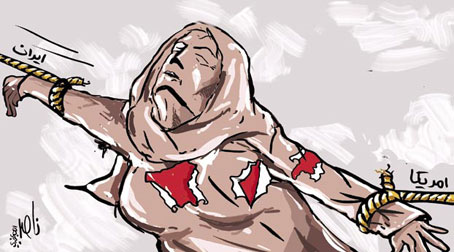“The first open signs of an American collision with Iran will occur in Iraq, after the liquidation of the major [Shiite] militias and paramilitaries allied with them.”
EDITORIAL
Translated By Mutasem Sinnokrot
January 24, 2006
Saudi Arabia - Al-Riyadh - Original Article (Arabic)
The carrier group of the Nimitz-Class USS Stennis,
now steaming toward the Persian Gulf. (below).
— BBC VIDEO NEWS: Washington send naval message
to Iran - the USS Stennis, Jan. 16, 00:02:45
The Nimitz Class USS Stennis: 100,000 tons of
nuclear-packed firepower now headed Iran's way.

Members of the Shiite militia, the Mahdi Army, cheer Saddam's
execution earlier this month. Saudis believe that shutting them
down could provoke open conflict between the U.S. and Iran.
'Iraq ... Between the U.S. and Iran' [Alquds, U.K.]

------------------------------------------------------------------------------
---LIFE INSIDE SAUDI ARABIA---

The official Saudi-government executioner for Mecca,
Abdallah Al-Bishi, explains his calling; demonstrates his
weapons and methods, Nov. 4. -WATCH VIDEO BELOW-
—MEMRI VIDEO: LBC TV, Lebanon - Official Saudi
government executioner for Mecca, Abdallah Al-Bishi,
tells of his life's work: chopping off heads, Nov. 4,
00:11:29
------------------------------------------------------------------------------
Is there a U.S. strategy for the ring of fire of Iraq, Iran, the Gulf and beyond? This question is being debated at America's highest levels, but the facts of these debates differ from those in [Arabic] media broadcasts. Even inside Congress itself - with its Democratic majority - the interests of the people are not managed according to personal whims, as is the case in third world countries …
[Editor's Note: The author is suggesting that the United States has a mature perception of the national interest, and that its representatives can rise above petty squabbling, which is not the image of the American debate that now prevails in the Arabic media].
It is our perception that America - which is up to its ears in Iraq - has come to realize its mistakes in dissolving the former Iraqi army and security forces, and enabling an individual community [the Shiites] to become its tool for ruling Iraq. This allowed Iran to work its way deep into Iraq, opening new fronts of confrontation with Sunnis and Baathists, who oppose the occupation and being governed by other communities.
The first open signs of an American collision with Iran will occur in Iraq, after the liquidation of the major [Shiite] militias and paramilitaries allied with them. This will expand the basis for animosity. But the scenarios that Bush's team is painting are similar to those which led to the expulsion of Saddam from Kuwait and eventually ended his rule. That war was not because Saddam expanded Iraq by a few more miles (by occupying Kuwait), but was due to the fear that Kuwaiti oil - added to Iraq's already vast oil resources - would have made Iraq the central power in the most dangerous region in the world.
It doesn't matter to the United States who rules the region in terms of whether they are Sunni, Shiite, or Kurd. It is rather the fear of who will control these oil reserves that explains Washington's current skirmishes with Iran. While Iran is essentially outside the interests of the American oil industry, it is a sensitive region geographically.
Therefore, any Iranian foothold in Iraq - whether through its Shiite allies or through historical ties from when the Persian Empire ruled many regions of the world - will result in the same American reaction. If Iran is permitted to control the vast oil resources of southern Iraq - which adds an economic and geographic dimension to this crisis - and in addition to this, Tehran's possession of nuclear weapons, even on a limited scale, then the entire Gulf region will be under threat of becoming a great oil reservoir for Iran. Thus the nuclear issue makes the present situation far more dangerous than it has hitherto been.
Strategically, such thinking is not new, and perhaps recent events have changed some of the parameters and policies; that is, those who took on the adventure of occupying Iraq never imagined that this would create such strategic and security problems and encourage the creation of a nuclear Iran.
And as we have already said, America’s interests rise above partisan or narrow national interest. For example, its unequivocal refusal to allow China to annex Taiwan is not because Taiwan constitutes an American military and strategic base; it is due rather to the fear of the “up and coming” superpower [China] gaining Taiwan's advanced technological and human capital. These fears are identical those that attended Saddam's annexation of Kuwait, or Iran's possible annexation of southern and middle areas of Iraq.
This means that a war against Iran could be imminent, and securing oil sources will be the major goal; not the sectarian or nationalistic goals that some might think, based on what is happening in the region right now. Even the issue of fighting terrorism is in synch with these goals.
The grand strategies often remain beyond the imagination and hopes of smaller countries ...
No comments:
Post a Comment